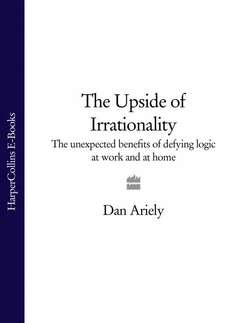Читать книгу The Upside of Irrationality: The Unexpected Benefits of Defying Logic at Work and at Home - Дэн Ариели, Dan Ariely, Dan Ariely - Страница 19
ОглавлениеCHAPTER 2 The Meaning of Labor
What Legos Can Teach Us about the Joy of Work
On a recent flight from California, I was seated next to a professional-looking man in his thirties. He smiled as I settled in, and we exchanged the usual complaints about shrinking seat sizes and other discomforts. We both checked our e-mail before shutting down our iPhones. Once we were airborne, we got to chatting. The conversation went like this:
HE: So how do you like your iPhone?
ME: I love it in many ways, but now I check my e-mail all the time, even when I am at traffic lights and in elevators.
HE: Yeah, I know what you mean. I spend much more time on e-mail since I got it.
ME: I’m not sure if all these technologies make me more productive, or less.
HE: What kind of work do you do?
Whenever I’m on a plane and start chatting with the people sitting next to me, they often ask or tell me what they do for a living long before we exchange names or other details about our lives. Maybe it’s a phenomenon more common in America than in other places, but I’ve observed that fellow travelers everywhere—at least the ones who make conversation—often discuss what they do for a living before talking about their hobbies, family, or political ideology.
The man sitting next to me told me all about his work as a sales manager for SAP, a large business management software firm that many companies use to run their back-office systems. (I knew something about the technology because my poor, suffering assistant at MIT was forced to use it when the university switched to SAP.) I wasn’t terribly interested in talking about the challenges and benefits of accounting software, but I was taken by my seatmate’s enthusiasm. He seemed to really like his job. I sensed that his work was the core of his identity—more important to him, perhaps, than many other things in his life.
ON AN INTUITIVE level, most of us understand the deep interconnection between identity and labor. Children think of their potential future occupations in terms of what they will be (firemen, teachers, doctors, behavioral economists, or what have you), not about the amount of money they will earn. Among adult Americans, “What do you do?” has become as common a component of an introduction as the anachronistic “How do you do?” once was—suggesting that our jobs are an integral part of our identity, not merely a way to make money in order to keep a roof over our heads and food in our mouths. It seems that many people find pride and meaning in their jobs.
In contrast to this labor-identity connection, the basic economic model of labor generally treats working men and women as rats in a maze: work is assumed to be annoying, and all the rat (person) wants to do is to get to the food with as little effort as possible and to rest on a full belly for the most time possible. But if work also gives us meaning, what does this tell us about why people want to work? And what about the connections among motivation, personal meaning, and productivity?
